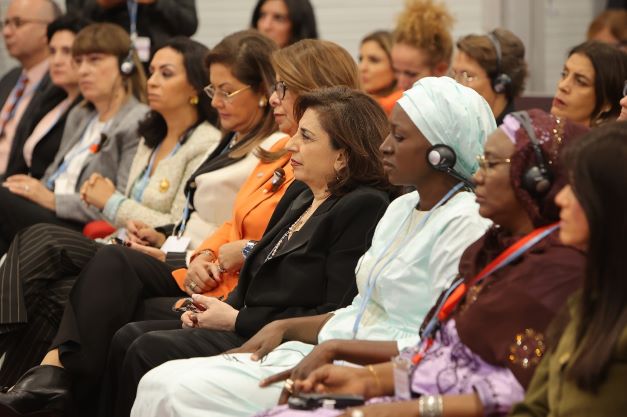PHOTO: Cross session of women and other participants at the COP27
By Evelyn Kpadeh Seagbeh
“We will not meet the 1.5-degree Celcius goal or any other goal without gender equality and the full contribution of women and girls,” Sima Bahous, the executive director of the United Nations Women told world leaders on Tuesday.
Madam Bahous’ statement came following the launch of the African Women’s Climate Adaption Priorities (AWCAP) at the COP27 in Egypt.
The launching is part of efforts to champion women as equal partners and have them as key players in implementing climate action.
The African Women’s Climate Adaptive Priorities (AWCAP) initiative promotes the inclusion of women for a climate-resilient future and focuses on strengthening women’s participation in environmental governance, leveraging opportunities within the just transition to the green economy, and achieving sustainable development (SDGs).
Commenting on the initiative, COP27 President H.E. Sameh Shoukry told cross-sessions of delegates that “Africa is responsible for less than 4% of global emissions and is disproportionately punished by the impact of climate change”.
He added that “rural women on the continent are among the most disadvantaged as they carry the weight working at home and in the fields,and are hurt by displacement due to climate change.” Mr. Shoukry was speaking at the Opening Session of the Gender Thematic Day.
He then called on all stakeholders and leaders to act with commitment in implementing a resilient water-energy-food transition that can provide socio-economic support to African nations and save lives and livelihoods.
The event was attended by Egypt’s Minister of Environment H.E. Dr. Yasmine Fouad, along with the President of the National Council for Women in Egypt Dr. Maya Morsi, the executive director of the United Nations Women Dr. Sima Bahous, and UN Climate Change high-level champion for women’s participation Dr. Mahmoud Mohieldin.
The African Women’s Climate Adaption Priorities are intended to break down barriers for women and ensure they have better access to education, support capacity building, and have women included in the transition to a green economy.
There has been a collective force of voices being amplified for the full participation of women at all levels as Maya Morsy, Egypt’s National Council of Women president lamented; “Globally we will find gender equality and women’s empowerment going backward if we leave women out of these agreements.”
Women in Africa rely substantially on environmental-related livelihoods, including agriculture, livestock management, forestry, water management, and health, all of which the UN says disproportionately exposes women to climate change.
Other experts and advocates of women’s rights and equal participation have warned that if the impacts of climate change on women are not mitigated, gender equity in 2030 will be back to where it was 12 years ago.
This story is produced as part of the 2022 Climate Change Media Partnership, a journalism fellowship organized by Internews’ Earth Journalism Network and the Stanley Center for Peace and Security.

